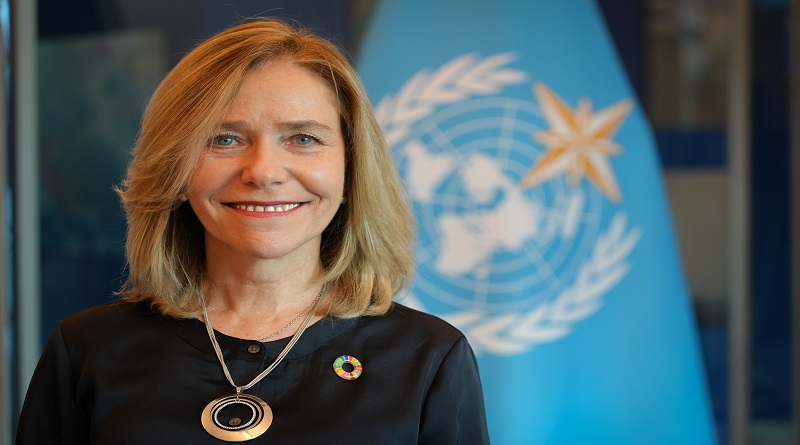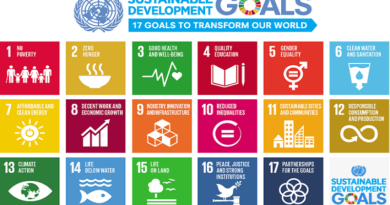World Economic Forum annual report again highlights environmental risks
World Meteorological Organisation (WMO) Secretary-General Celeste Saulo will engage with the public and private sector leaders in Davos to strengthen collaboration against escalating global risks at the World Economic Forum.
Environmental risks have become the greatest source of long-term concern and are projected to intensify over the next decade, according to the World Economic Forum’s annual Global Risks Report.
Now in its 20th year, the Global Risks Report was published ahead of the annual meeting of the World Economic Forum in the Alpine resort of Davos.
WMO Secretary-General Celeste Saulo is among the hundreds of government, business, UN and civil society leaders who have been invited to attend the prestigious gathering.
She will seek to forge new relationships with the corporate sector to support climate adaptation by leveraging the Early Warnings for All initiative’s private sector engagement strategy, and to help ensure informed climate mitigation. This includes through the Global Greenhouse Gas Watch initiative.
Investment in hydromet services, and in early warnings, makes economic sense and will be one of WMO’s main messages in Davos.
The theme of the World Economic Forum annual meeting is Collaboration for the Intelligent Age.
Technological advances such as Artificial Intelligence, cloud computing, satellites and Big Data are opening new horizons for weather forecasting and climate monitoring. At the same time, extreme weather and climate change impacts are worsening. The year 2024 was the warmest on record, capping the ten warmest years on record.
The Global Risks Report shows how, over the last two decades, environmental risks have steadily consolidated their position as the greatest source of long-term concern.
“This year’s Global Risks Perception Survey shows that a sense of alarm is also mounting in the shorter term: Environmental problems, from extreme weather to pollution, are here now and the need to implement solutions is urgent,” it says.
Over the next decade, environmental risks are projected to intensify, with extreme weather, biodiversity loss, and disruptions to Earth’s systems emerging as the most severe challenges.
These risks underline the urgent need for long-term strategies to safeguard ecosystems, secure resources, and mitigate climate-related impacts. Addressing these challenges requires a global commitment to sustainability and innovative approaches, it says.
Chart from the World Economic Forum showing global risks by severity, split into short-term (2 years) and long-term (10 years), with categories: economic, environmental, geopolitical, societal, and technological.
The Early Warnings for All initiative is an example of one such strategy to mitigate climate related impacts. Launched by UN Secretary-General António Guterres, it seeks to ensure that everyone on Earth is protected by life-saving Early Warning systems.
“The climate crisis demands a collective, “whole-of-society” approach, reaching across sectors and disciplines. Broadening the tent is not just about involving more actors; it’s about empowering everyone to champion Early Warning Systems as a core priority,” says Celeste Saulo.
The Early Warnings for All initiative is spearheaded by the UN Office for Disaster Risk Reduction (UNDRR) WMO, International Telecommunications Union (ITU) and International Federation of Red Cross and Red Crescent Societies (IFRC) – supported by many other partners.
There is both a business and human imperative.
“We have shown that there can be a return on investment of 1 to 9. That means that for each $1 you put in early warnings, you will get a benefit of $9. And this is at the global scale. But if we moved to the maybe continental scale in Africa, this return on investment moves to 1 to 19,” says Celeste Saulo.
“How? Because you are protecting your livelihoods, you are protecting people and you are protecting your infrastructure,” she said in an interview with the World Economic Forum in 2024.
The World Bank has estimated that universal access to early warning systems would result in total avoided annual losses of US$ 35 billion. The Global Commission on Adaptation found that just 24 hours warning of a coming storm or heatwave can reduce the potential damage by 30%.
Collage showing satellite dish, volcanic eruption, two people with a radio, and a rescue boat in floodwaters. Text: “Early Warnings for All – Private sector engagement strategy.
The business community benefits immensely from weather information, as shown by a survey by the Weather Company. Its commitment to Early Warnings for All is vital for resource mobilization and also to make warnings better, more targeted and more trusted.
One of the core objectives of Early Warnings for All initiative is therefore to catalyze the private sector to help deliver sustainable public early warning systems.
A Private Sector Engagement Strategy seeks to increase the momentum. It explains the rationale; the business opportunities and benefits; the entry points and the principles for engagement.
It seeks to further embrace businesses which are an increasingly important source of investment in the infrastructure and capacity needed for Early Warnings for All.
Already, meteorological equipment manufacturers have a formal agreement with WMO, and the satellite industry is being actively engaged. Telecommunications and IT giants such as Microsoft are also playing a high-profile role.
But there is huge untapped potential to reach out to weather monitoring and data management companies; mobile network operators and media companies that disseminate warnings; the insurance and re-insurance sector and companies that can provide risk management solutions and anticipatory action.
The rationale is as follows:
Companies ranging from start-ups to BigTech can provide speedy delivery and reach of warning information, artificial intelligence (AI)-driven data fusion and analysis to understand hazard impacts.
Private sector companies are important weather and climate-related risk knowledge providers, communicators and risk managers. Private sector action to build resilience and adaptation of business operations helps reduce the risk level of the whole society.
Increased resilience contributes to a more attractive investment and business climate. Climate and disaster resilience saves lives and avoids losses, unlocks economic potential, and generates development co-benefits.
Extreme weather impacts income statements. An overwhelming majority of business executives say better weather-related insights can reduce costs and increase revenues.
Support to early warning contributes to corporate social responsibility which is an imperative for 21st century business leaders.
National policy and regulatory frameworks need to enable public-private engagement (PPE) to support early warning. Leveraging private sector capabilities without jeopardizing the provision of public services is a key condition to maximize the socioeconomic benefits of early warning systems.
The Private Sector Engagement Strategy also lays out general principles of integrity, accountability, transparency, diversity and inclusiveness.




